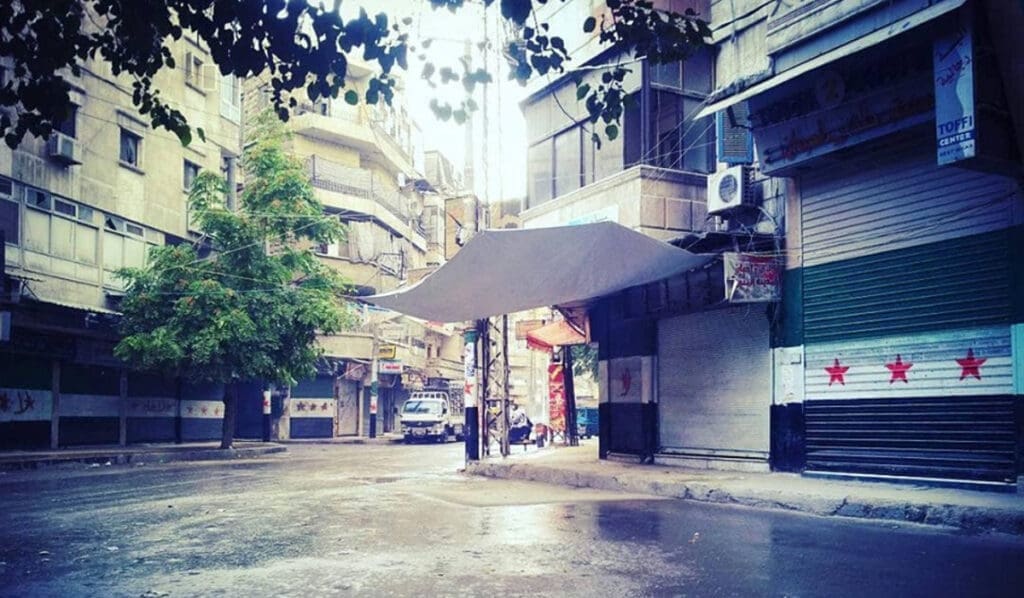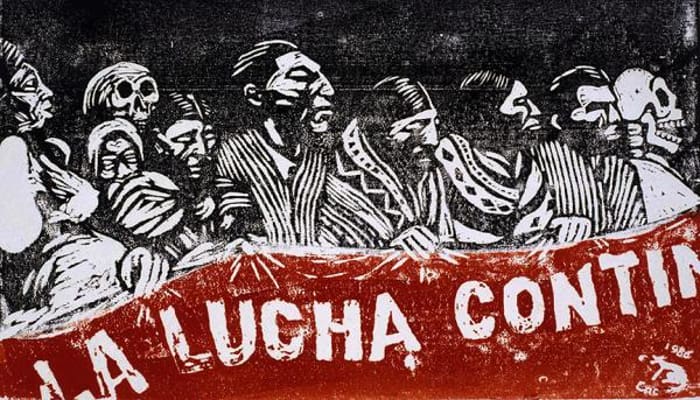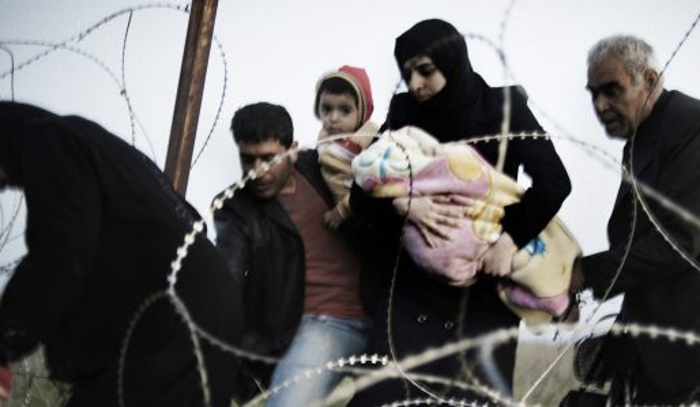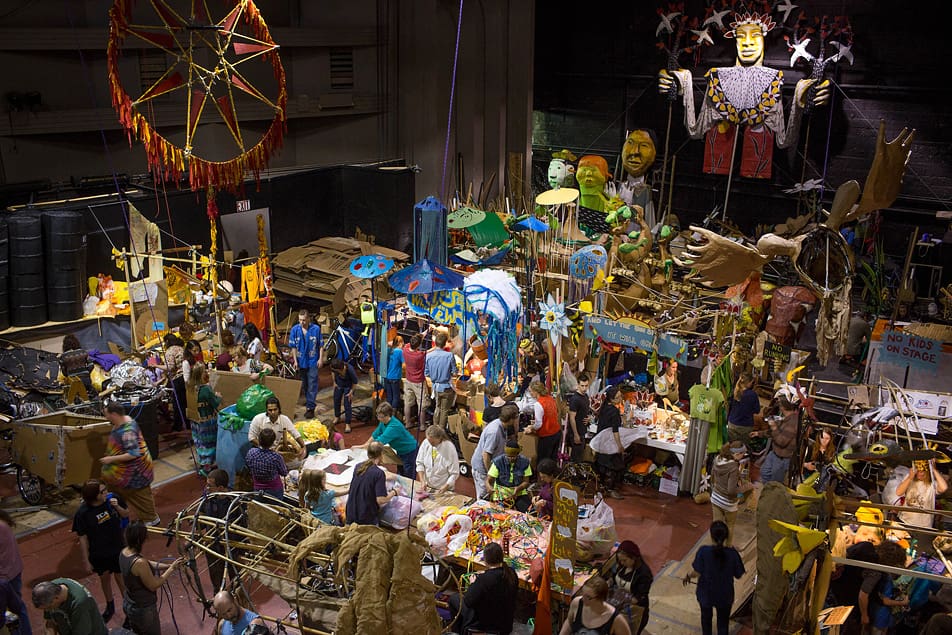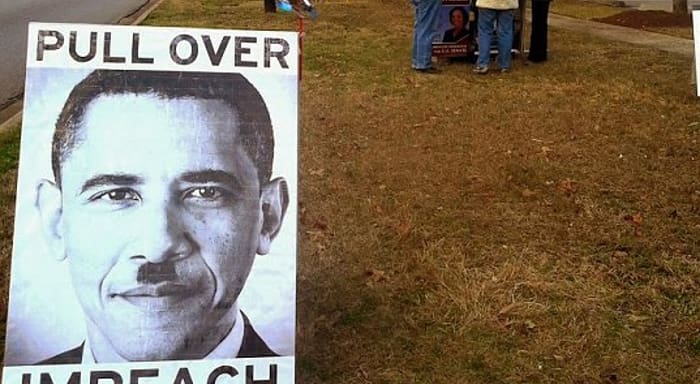Antinote: What follows is a very belated translation of an angry, despairing, combative text composed in Switzerland during the long, devastating siege of Aleppo (just a couple of months before it ended with the forced evacuation of east Aleppo’s remaining residents, another war crime among many committed by the Assad regime). It came after years of frustration with the callousness and racism displayed by the Western left in its misapprehension of and response to the Syrian people’s struggle for freedom and dignity.
Already in 2016, we couldn’t take it anymore. In the years since this was written, little has changed despite sustained internal struggles to overturn the long legacy of complicity in fascist violence and mass murder, through word and deed, within many Western left institutions. The response has been, and remains: deny, attack, reverse victim and offender.
Nonetheless we stand by our words. As the Arab League embraces the genocidal Assad regime and the European Union flirts with normalization (while the UN plays footsie with mass killers as it always has); as Syrian refugees continue to be attacked and forcibly deported back to near-certain death from Lebanon and Turkey; as boats continue to sink in the Aegean, with deaths in the hundreds, to the minimally credible “shock and horror” of the European government leaders responsible…we still demand freedom and justice for the Syrian people, and the fall of every tyrannical regime, starting with Assad’s.

Syria, from Below and to the Left
by Antidote’s Laurent Moeri
27 October 2016 (deutsche Originalversion hier einzusehen)
Foreword: The greatest revolution since the Spanish civil war is taking place, and all that we hear is the chirping of crickets. It is a bottomless silence. “It’s complicated” is the convenient excuse. Ironically, Syria itself was called the “Kingdom of Silence” before the revolution. In March 2011, this silence exploded into a multitude of voices.
The source of the violence in Syria is in fact not that difficult to understand. Syria was a totalitarian dictatorship for four decades. Syria was a fascist police state fueled by racism and corruption that subjected its people to a capitalist economic system serving only a rich ruling clique: the Assad gang.
In 2011, courage and imagination gripped the masses, and Syrians made space to voice their frustrations and called for transformation. They had had enough of corruption and joblessness. They had had enough of all-pervasive violence and limitless poverty. In rage that children had been tortured for spray-painting anti-regime slogans, a cry of revolt rang across the country demanding an end to Assad’s repressive rule, expressing at the same time the desire for freedom—for the people to take the fate of the country into their own hands.
Antidote has always sought to provide an outlet for stifled voices. Not only because they are typically ignored, but also because they are writing history. Many Western leftists and anarchists have trouble with the topic of Syria, but the war in Syria is the defining conflict of our time and a test of our movements—a moral as well as a political-ethical compass for future struggles.
They think they have more powerful weapons—we have stronger hearts. Many of you have freedom thanks to a revolution. The time for our freedom is now!
– Unknown
From Protest to Revolution to Civil War
Almost six years ago, a produce vendor in Tunisia self-immolated and unleashed unprecedented energies—like a wildfire, new and radical conceptions of freedom swept across vast swathes of land and through its inhabitants.
The rulers in Tunisia, Egypt, Libya, Yemen, Bahrain, Saudi Arabia, and Syria were suddenly witnessing a new era. For a moment, nothing was like before. For a moment, everything was possible. On 15 March 2011, a dozen Syrian children went down to their school during the night and scrawled regime-critical slogans on the walls: phrases that they knew from images on television, that they had only heard spoken out loud for the first time on Tahrir Square in Cairo.
These schoolchildren were arrested the next day by the mukhabarat (air force secret police); their parents were told to forget them and make new ones. Rage over the arrests ignited protests. At the beginning, the protesters demanded only reforms—but on 18 March the first demonstrator was killed, at a funeral. As more people were killed, calls for the regime to fall became more and more common.
Many Syrians describe their first protest as an ecstatic experience. The regime’s response to their hopes, however, was raw, unholy brutality. From protest to funeral to protest, a cycle of violence began to emerge that people ultimately didn’t know how to break. When soldiers began deserting the army, returning to their hometowns to protect their families, and as civilians began to reach for weapons themselves, the revolution militarized.
Book recommendation: Burning Country by Leila al-Shami and Robin Yassin-Kassab, published in 2016 by Pluto Press. Leila and Robin are both close comrades and good friends.
Up to now, the conflict in Syria has cost more than half a million lives. Twelve million people have been displaced from their homes. Cities have been reduced to rubble and ash, sparking a mass migration of incomprehensible proportions. In response, the populist parties of Europe have been strengthened and are putting the European Union through new stress-tests of its own. Syria has, over these six years, become a playground for a geopolitical power struggle in which various “great powers” compete for primacy.
The conflict in Syria has gone through different phases. To summarize, the conflict went from protest to revolt, from revolt to rebellion, from rebellion to civil war. The civil war was then internationalized: whether through the military intervention of Russia, Iran, and Hezbollah, through the interventions of the US and Qatar, or through the international jihadists of Daesh (ISIS). The next phase could be on the doorstep for Syrian revolutionaries: national liberation.
The Left and Alibaba
Syria is a test for the Western left that it is, in large part, failing miserably. This failure is driven by a discourse that rationalizes the lack of solidarity. One might think of couch-comrade Žižek in this regard. “There is no significant moderate opposition,” they say, and because we don’t take a closer look for ourselves, that seems credible. Other leftists, especially Stalinists, have even decided to back Bashar al-Assad, and a worldwide red-brown alliance has formed in support of the genocidal regime of the Butcher from Damascus.
Tragic and enraging: many Syrian activists might have thought this to themselves when they were abandoned by leftists in the West as their revolution was just beginning. Even worse, many leftwing parties have played a massive role in spreading a depiction of the revolution riddled with falsehoods. Under the banner of a distorted “anti-imperialism” and driven by an Orientalism bordering on Islamophobia, they have renounced and denied the struggle of an entire people for freedom and social justice. Their message has a subtext: There are no social revolutionaries in the Middle East, just camels and the oppressed, apolitical masses.
This worldview is propped up by a poorly-aged thought pattern with origins in the Cold War: the main thing is to support any state that officially declares itself an enemy of the United States. “The US wants to regime-change Assad! Russia and Iran are anti-imperialist allies of the glorious Assad regime!” The logic goes something like that. It obviously only works if one ignores that these states have imperialist ambitions of their own, they mercilessly repress their own civil societies, and are a long way from presenting viable alternatives, to say the least.
In the present day just as in the old days: this is the same “type” of leftist who previously promoted the colonization of Algeria, and the same leftists who celebrated Fidel Castro and Mao. Just dipshits, really. Mostly white and privileged, always nice and arrogant, with Eurocentric blinders on, Orientalist in a slightly sexualizing way.
But their logic and rhetoric suffers from an even greater flaw: the US never intended or attempted to overthrow Assad. Not at the beginning of protests, not at the protests’ militarization, not after the chemical weapons attacks—at no point was there a US effort to topple the regime. This is exhibited most clearly in the US’s refusal to equip moderate elements of the Free Syrian Army with weapons like anti-tank or surface-to-air missiles. Such weapons could have led swiftly to the fall of the regime. But the progressive forces of the Syrian revolution were also betrayed many times in the early days by their more natural “allies.” Highest on that list: anarchists and radical Marxists.
What has shown itself to be true—and not only in Syria—is that the institutional left has parted ways with normal people. The institutional left has shown that it no longer believes in transformation from below, and is preoccupied with states—as if there were such a thing as a “good” state. From a Marxist perspective, support and solidarity runs along class lines, and against the ruling class. This is what makes a politics leftwing: identifying allies and taking their side in struggles against oppression—even if only in word and not in deed. There is no other way to put it: the Western left has utterly and comprehensively failed to do this.
Even more disturbing is the racist and Orientalist analytical basis necessary to discredit a revolution so badly. How deeply has the left been poisoned by ignoramuses, to dismiss an entire population and their irrepressible urge for freedom either as Islamist terrorists or inert geopolitical instruments—or, at best, as helpless victims, refugees? The authoritarian Western left has, in light of the tragedy in Syria, lost both its credibility as well as its right to speak on the matter. If they cannot, given time, begin to address this, they are well on the way to complete irrelevance.
The Project in Rojava
One glimmer of light for the beleaguered Western left appears to be Rojava. If the left was unable to pony up for the Syrian revolution, they can hardly contain their ecstatic solidarity for the fighters in Rojava.
This stretches from worldwide solidarity demonstrations, fundraisers, and even the collection of arms all the way to brave, selfless, dedicated individuals making the journey to Rojava themselves in order to serve with international battalions reminiscent of the Spanish civil war.
It is beyond doubt that one the most impressive recent advances of the progressive movement has been made in Rojava. Kurdish people carry with them a long, tragic history of oppression and persecution by the states they live within. Under Assad, they could not speak their own language and were relentlessly targeted by policies of “Arabization” which were established primarily to control their natural resources.
From democratic confederalism and self-governance to women’s emancipation, these deep transformations are even more impressive for having taken place in the middle of a bitter fight against the barbaric fascists of Daesh. As a result, many supporters of Rojava have taken dogmatic and uncritical stances on the project.
Especially when it comes to the military dimension of the Kurdish struggle in northeast Syria, many leftists in the West have minimized or ignored major contradictions—contradictions that stand in conflict not only with the principles of the Rojava revolution itself, but that endanger the future adoption and spread of anti-authoritarian values in the region. The PYD, after having announced its adherence to anti-authoritarian principles a couple years prior, has nonetheless been logging its share of crimes—the most disturbing example of which has been the sporadic closure of border crossings to refugees from Syria.
Some of the principles of the Rojava revolution are cultural and political autonomy, as well as secular pluralism. At the same time, however, the PYD has pursued a strategy of uniting the three Kurdish cantons in northeast Syria: the regions of Afrin, Kobane, and Jazira—separated by great geographical distance—are to be united, militarily. Admittedly, these areas have been historically inhabited by majority-Arab populations. Thus the PYD and its military units have been accused of opportunism and chauvinism—on the one hand for only looking out for itself; on the other for using the broader Syrian revolution (instead of even acknowledging it!) as a chance to found its own state. This dynamic has exacerbated ethnic tensions in northern Syria.
This situation has often been defended, from the left, with the argument that the Arab opposition in Syria is comprised only of “head-chopping jihadists.” It is worth hoping that the forces of the Free Syrian Army and the Kurdish YPG/YPJ can settle their differences, and bridge this divide in the name of a still uncertain future. [Translator’s note, 2023: they haven’t, to the detriment of both—we recently republished a scholarly analysis of this tragic failure]. This seems all the more important now that Turkey—alongside Russia and Iran—has also entered the Syrian conflict militarily.
From an anti-authoritarian perspective, the Kurdish people’s struggles for autonomy are of course to be fully supported, whether in Syria, Turkey, Iraq, or Iran. But so equally is the Syrian people’s struggle for autonomy, which must defend itself simultaneously from Islamist totalitarianism, the genocidal Assad regime, and foreign-backed militias (whether from Iran or Serbia or anywhere in between).
In Syria, Omar Aziz was one of the revolution’s anarchist intellectuals—he was convinced that in order for the revolution to succeed, it must permeate and transform every aspect of social life. He formulated the idea of the Local Coordination Committees (LCCs). As the state withdrew from liberated areas, government services also disappeared; the LCCs tasked themselves with self-organizing, from below, such basic necessities as education, healthcare, the distribution of aid, and much more. In a country which was, before the revolution, ruled by one man, there are now more than four hundred local councils operating. In a country that had had no opposition media, there are now more than six hundred new publications; countless free radio stations crowd the airwaves; art and culture explore new worlds as never before.
It is these local councils that sustain daily life in the liberated areas today, that ensure there is electricity and water, that build new hospitals and underground schools. This self-organization is impressive, and although most participants do not describe themselves as anarchists, they repeatedly show they have long internalized these principles. Direct, local democracy is being lived out here—and all that we hear from the left, between the bombs and shells, is the chirping of crickets.
Back to Aleppo
Now, many in the West present the situation as though a military intervention à la Iraq were necessary, and they don’t want this (because they stand for “peace”). However, Syrian revolutionaries have never asked for that—quite the opposite. Only two military elements have been requested: first, lifting the arms embargo, and second, establishing a no-fly zone. For every anarchist, for every radical (who knows their history), alarm bells should be ringing. We know this scenario. We’ve known it since Spain 1936, and were able to observe it again in the nineties in Bosnia.
The greatest threat to the Assad regime does not come from outside. The greatest threat to the Assad regime is neither ISIS nor the US. It is the Syrian people who will topple Assad, who are still—after all the violence and state terror—dedicated to their revolution. Anyone who follows events in Syria knows: during every ceasefire, countless demonstrations and protests erupt. Syria’s civil society uses every breath-catching moment to make itself heard and seen. Instead of taking a break to recover, the people announce once again their unbreakable will to freedom. Anyone who wishes to see Daesh and its ideology defeated will sooner or later realize that only the local population can accomplish this.
The Syrian revolution is the most profound revolution the world has seen since the Spanish civil war. I say this without the slightest doubt. It is time for Europe’s radicals to get off their high horse.
The Syrian revolution is a wellspring of countless lessons and inspiring stories. Such profound transformations happen only rarely in history. We should be “happy” we get to experience it. And we should be willing—for the sake of our own struggles—to learn from it. Radicals and anarchists should surely be the first, without prejudice, to recognize the scope of this revolution and stand in solidarity with the revolutionary masses in Syria.
Ash-shab yurid isqat an-nizam!
Featured image: Aleppo, 2015. Photograph by Akram Saud.

